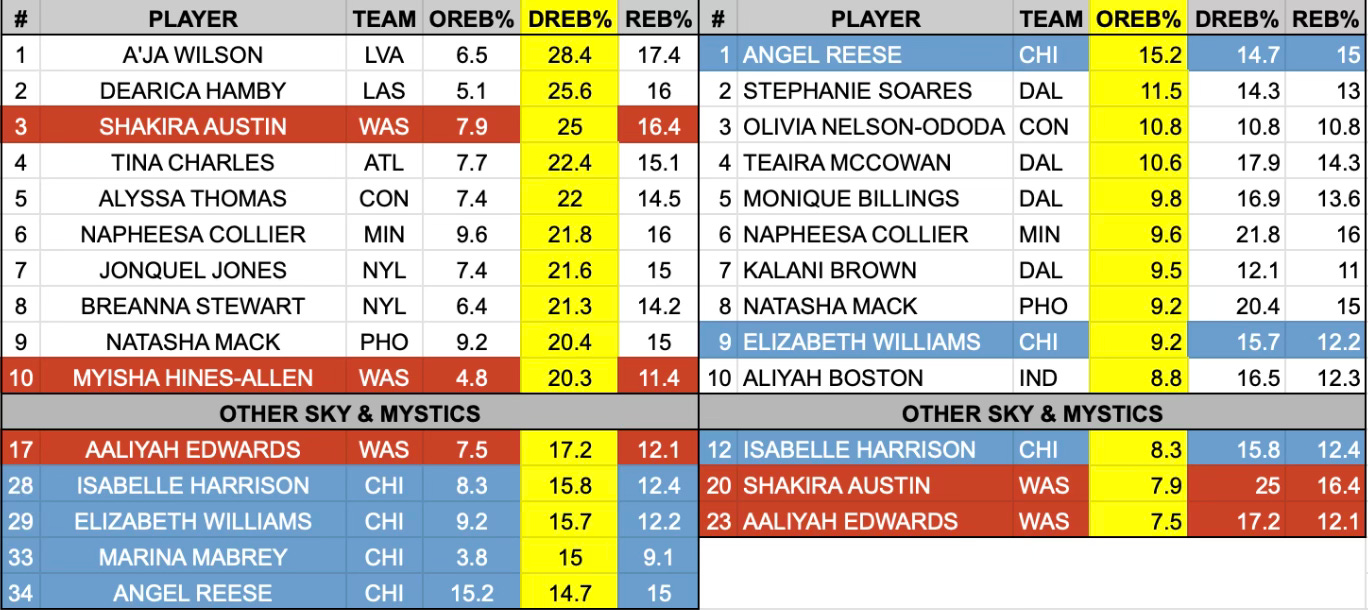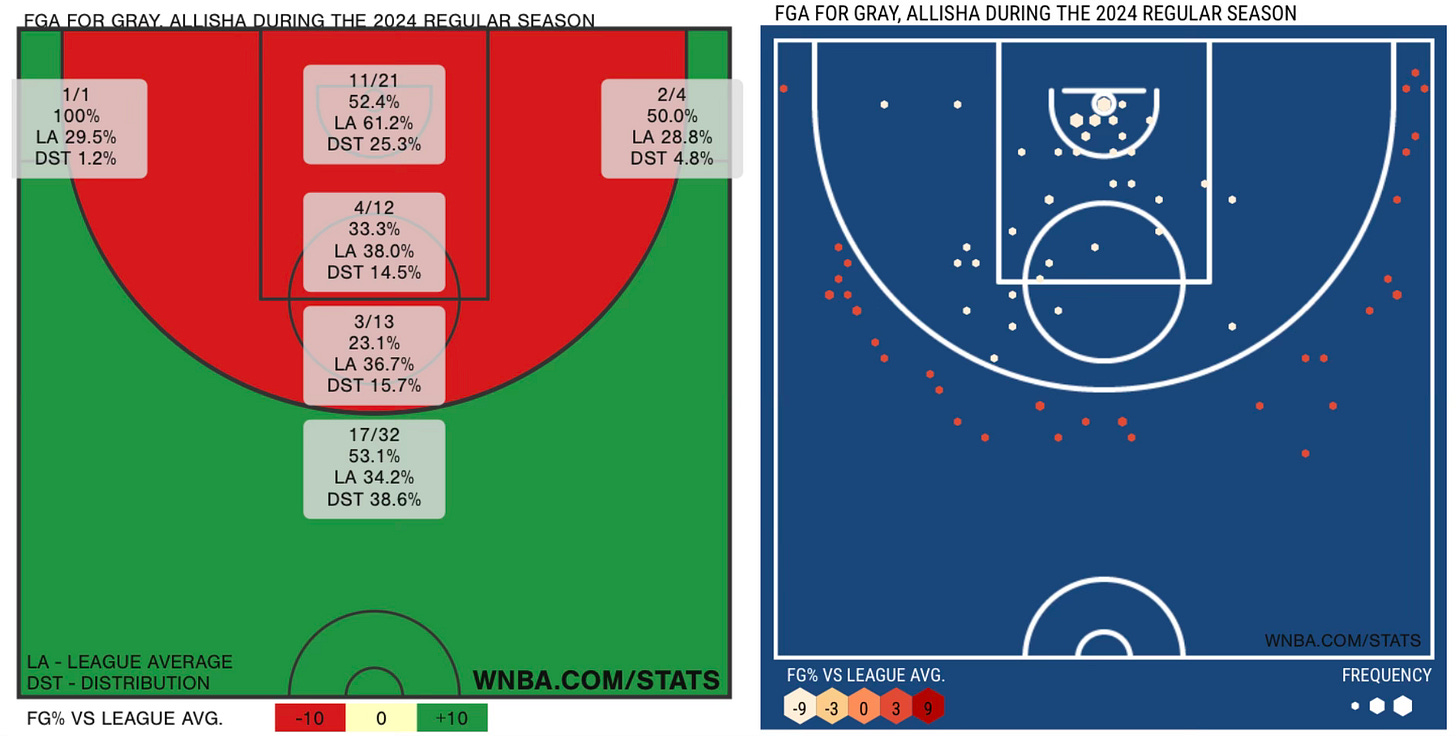Weekend Preview: Sky visit Mystics, host Dream
The Sky's Commissioner's Cup campaign continues with a trip to the capital to face the Mystics and a visit from Atlanta.
After Tuesday night’s loss to the Liberty, Teresa Weatherspoon and the Sky have little time to rest (or practice) before they return to action on Thursday night in Washington against the Mystics. After that quick one night trip for the Sky’s third of five Commissioner’s Cup games, Chicago will then return home from DC on Saturday to face the Atlanta Dream. With the Mystics (0-9) and Dream (4-3) off to two very different starts, let’s dive into what to anticipate from both and hone in on what the Sky need to specialize in to pick up their first Cup win.
Sky at Mystics
Thursday, June 6th at 6:00 PM CT on Prime Video (Commissioner’s Cup Game)
Matchup to Watch: Sky Offense vs. Mystics Defense on the Glass
Though Washington ranks last in the W in defensive rebounds per game (22.9), they’re actually third best in defensive rebounding percentage (76.6%)—with their pace and ability to turn opponents over creating the disparity between the two metrics. And while Eric Thibault typically staggers minutes between Myisha Hines-Allen and Shakira Austin (giving the Mystics at least one elite rebounder on the floor 35+ MPG), the Mystics will be without Austin for the second consecutive game due to a hip injury on Thursday night. With Austin out Tuesday, Aaliyah Edwards (23.8 DRB%) comfortably stepped up to the plate and filled the void with the Mystics exceeding their season average with an 80% team rate. In any case, Weatherspoon should feel confident that Harrison and Kamilla Cardoso (6.8%) can maintain any momentum that Williams and Reese are able to create when the starters rest.

Indeed, as a team, the Sky have coped well against the league’s better defensive rebounding teams so far. New York & Seattle both rank in the top 6 and Chicago held each 4-5% below their season average. To further underline the Sky’s strength, none of the league’s top three (Vegas, Atlanta and Washington) in defensive rebounding have played Chicago yet. At a time when sample sizes are still small, it’s safe to say not playing the Sky likely helps each of those three rank above the teams the Sky have played—thought games against the Dream and Mystics this week will test that theory. In any case, a strong showing on the offensive glass is key for a Sky team that’s second in the W in team offensive rebounding and derives 14% of all of their scoring from second-chance looks.
Of course, the elephant in the room when it comes to the graphic above is the flip side of this battle. The Sky are one of the W’s worst on the defensive glass (69.7% - 11th) while the Mystics rank relatively low on offense (23.1% - 7th). As a result, the Sky concede more 2nd-chance points than any other team (15 PPG) while the Mystics score the league’s fewest (7.3 PPG). Winning the “battle of the strengths” makes a statement, but edging this “battle of the weaknesses” is also key.
Numbers Game: Assist Rates
The Sky have averaged 24.7 assists per game in their 3 wins and just 16.2 in their 5 losses. If the Sky guards work downhill and in the pick-and-roll and distribute off of those actions, the offense flows pretty well. When they don’t do those things (or can’t—like Tuesday’s 4Q), Chicago lacks the spot-up shooters, dominant post scorers or isolation specialists (besides Mabrey) needed to build a 1-on-1 heavy offense around. Of course, scores in transition also often come from assists, and the Sky—who lead the W in fast-break scoring (14.1 PPG)—have more success when they create lots of easy looks with their defense.
Meanwhile, the Mystics have dished out 20+ assists as a team in all but two of their games so far, and their 19.4 per game are the sixth most in the league. To go further, the Mystics—because of their low scoring output—are actually second in the WNBA in percentage of field-goals assisted at 73.8%. A team effort, of course, is needed to make this possible but much of the credit should go to rookie Julie Vanloo. The European veteran, who won EuroBasket last summer with Belgium, has quickly adapted and currently sit second in the league in assist percentage behind only Alyssa Thomas. Given her European roots, this should come as no great surprise, but Vanloo has done a tremendous job of organizing Washington’s offense—in spite of its struggles and inefficiency. With the Mystics’ lone sub-20 assist games resulting in their only true blow-out losses (to the Storm and Sun), expect Vanloo and company’s success (or lack thereof) when it comes to moving the ball to help decide whether the Sky can comfortably dispatch of a team they will probably feel they should beat.
Sky vs. Dream
Saturday, June 8th at 4:00 PM CT on NBA TV (Commissioner’s Cup Game)
Matchup to Watch: Rhyne Howard vs. Chicago’s Team Defense
Howard scored more points in three meetings with Chicago last season (23 PPG) than against any other opponent. To correct this trend Saturday, Weatherspoon will need all of Diamond DeShields’ length and athleticism to knock the 6′ 2″ Howard out of rhythm as often as possible. And, in truth, that’s all you can try to do. Because of her ability to score from anywhere—irrespective of the defensive coverage, there is no realistic way to stop Howard.
Take the Dream’s last game against Connecticut on Sunday. Given Howard shot 2/9, you’d figure that the defense from Dijonai Carrington had a huge impact, but the coverage—on the shots Howard did take—wasn’t always that suffocating. (In fact, I love the creative play calling Tanisha Wright used to generate these looks.)
Where the Sun did have a lot of success was in limiting Howard’s opportunities to get shots up and find the spots she’s comfortable scoring from. And while many will try to limit a great scorer in this way, it’s much easier said than done with Sunday’s loss marking only the 5th time in 80 W games that Howard has been held below 10 attempts. The Sky’s young and newly formed group shouldn’t expect to match the Sun’s coordination or versatility of coverage at the defensive end, but there’s still lots to learn from what Connecticut did. With her threes not falling (Howard is 0 for her last 18 entering Thursday’s game against NY), the Sun applied heavy pressure on the perimeter and ensured Howard couldn’t recapture her rhythm in the mid-range or via easy looks at the basket. DeShields and company probably can’t fully match the timing or disruptiveness of the Sun blitzes, but they can aim to force Howard to work, primarily, from long-range and hope that she takes at least one more game to shake this slump.
Numbers Game: Allisha Gray 3 Pointers Made
Early in the Dream season, the oft-underrated Gray has shot the ball well from basically everywhere—putting together staggering 46/54/72 splits. Yet, her hot hand appears even hotter when the Dream win (62% 3PT) than when they don’t (36%), and that’s hardly a coincidence. For all the individual brilliance a multi-level player like Howard or a dominant inside scorer like Cheyenne Parker-Tyus adds, Gray’s ability to knock down shots is transformational for the Dream. And, this is nothing new either. A year ago, Gray suited up 38 times and Atlanta was a perfectly-average .500 in those games. In wins, she shot 39.7% from three while that slid to just 30% in the 19 losses.
Some of this, of course, seems like simple logic: important player shoots well, team performs better. Even then, a difference of nearly 10% suggests a pretty substantial impact on the result. Howard, for contrast, shot only 3% better from long-range in wins than losses last year. Considering her considerably higher volume of attempts (281 vs. 118 for Gray), her differential seems to be much less of a “swing” factor than Gray’s (though Howards’s 12% FG differential in W/L in ‘23 tells a notable story too). And though it’s early, it appears the Dream are leaning into this advantage even more than a season ago as Gray’s attempts from three are about 70% higher (5.3 vs 3.1) and are even exceeding the career-high 4.8 per game she took in 2022 with Dallas. As long as it’s going this well, there’s an argument that Tanisha Wright should ask Gray to take even more threes—though they’ll want to toe that line carefully. In any case, the task for Chicago on Saturday will be limiting Gray as much as possible—knowing that Atlanta’s offense becomes far less multi-dimensional without her influence.


